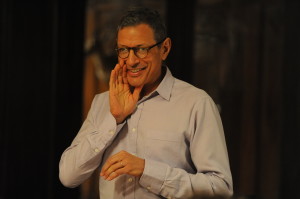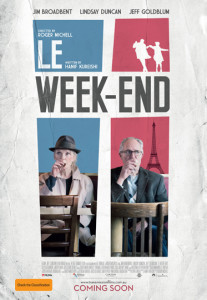Le Week-End (Roger Mitchell, UK, 2013, 93 min.)
Sundance Cinemas thru Thursday, May 22 (check back for update)»
Le Week-End is about a couple who, for their 30th wedding anniversary, attempt to light a romantic spark within their deteriorating relationship by taking a second honeymoon in Paris. The film drops the viewers into the middle of a complex marriage, with baggage built up for decades, and watches while they go back and forth between love and hate. The two characters, Meg (Lindsay Duncan) and Nick (Jim Broadbent), convey such realistic and relateable feelings and actions, that I couldn’t help but take Le Week-End as an accurate, inevitable, display of marriage after 30 years. Though it is hard to accept the harsh realities the film presents at times, Nick and Meg are a very enjoyable and intriguing couple to watch.
The film reminded me of art films from the 1960s since it concentrated on feelings of isolation experienced even when in a couple. The character subjectivity is the most revealing part of the story and it is conveyed largely through stylistic choices. Close-ups of both Nick and Meg successfully communicate their pain or happiness, and one of my favorite scenes of the film consisted of mostly close-ups of Nick listening to a Bob Dylan song through his headphones. Within the scene jump cuts alternate shots of Nick singing joyfully and shots of him looking close to death. The song was continuous across the cuts while the shots did not provide accurate continuity. The style, therefore, reinforced the almost coinciding presence of opposite emotions.
 The whole film operates in this bipolar fashion. At one moment the couple seems to be re-connecting and a moment later they are on the verge of divorce. Whenever I thought that a resolution was coming, the story took sharp turn into another fight. What they fought about is not always made clear, and really only parts of their past are expanded on and explained. But without the elaborate exposition, the characters are complex and realistic due to Duncan and Broadbent’s performances. The story, unlike so many other stories about aging adults, was not about a marriage being threatened by sickness or adultery or another extreme case, it was about an ordinary couple facing the problems of boredom and regret that comes with a long marriage. Though I am not, or have never been, in the same situation I could easily relate to the feelings and situations of both characters.
The whole film operates in this bipolar fashion. At one moment the couple seems to be re-connecting and a moment later they are on the verge of divorce. Whenever I thought that a resolution was coming, the story took sharp turn into another fight. What they fought about is not always made clear, and really only parts of their past are expanded on and explained. But without the elaborate exposition, the characters are complex and realistic due to Duncan and Broadbent’s performances. The story, unlike so many other stories about aging adults, was not about a marriage being threatened by sickness or adultery or another extreme case, it was about an ordinary couple facing the problems of boredom and regret that comes with a long marriage. Though I am not, or have never been, in the same situation I could easily relate to the feelings and situations of both characters.
 And then there’s Jeff Goldblum, who adds much needed energy to a film that concentrates so closely on two aging, exhausted, adults. His character, Morgan, has an academic background similar to Nick’s. They knew each other as philosophical activists, but since then have taken very different paths. Morgan is younger, he has more money and has moved on to a new wife, while Nick is desperately clinging to his first marriage as his professional life falls to pieces. The contrast between them helps clearly define Nick’s situation and struggles. Though the character of Morgan is a bit over-the-top, and less realistic than the characters of Nick and Meg, Jeff Goldblum is very entertaining to watch and a pleasant addition to the film.
And then there’s Jeff Goldblum, who adds much needed energy to a film that concentrates so closely on two aging, exhausted, adults. His character, Morgan, has an academic background similar to Nick’s. They knew each other as philosophical activists, but since then have taken very different paths. Morgan is younger, he has more money and has moved on to a new wife, while Nick is desperately clinging to his first marriage as his professional life falls to pieces. The contrast between them helps clearly define Nick’s situation and struggles. Though the character of Morgan is a bit over-the-top, and less realistic than the characters of Nick and Meg, Jeff Goldblum is very entertaining to watch and a pleasant addition to the film.
Without giving much away, I loved how the film ended. It didn’t answer every question I had and did not have total closure but it did re-establish some hope in relationships that was slowly lost throughout the rest of the film.
